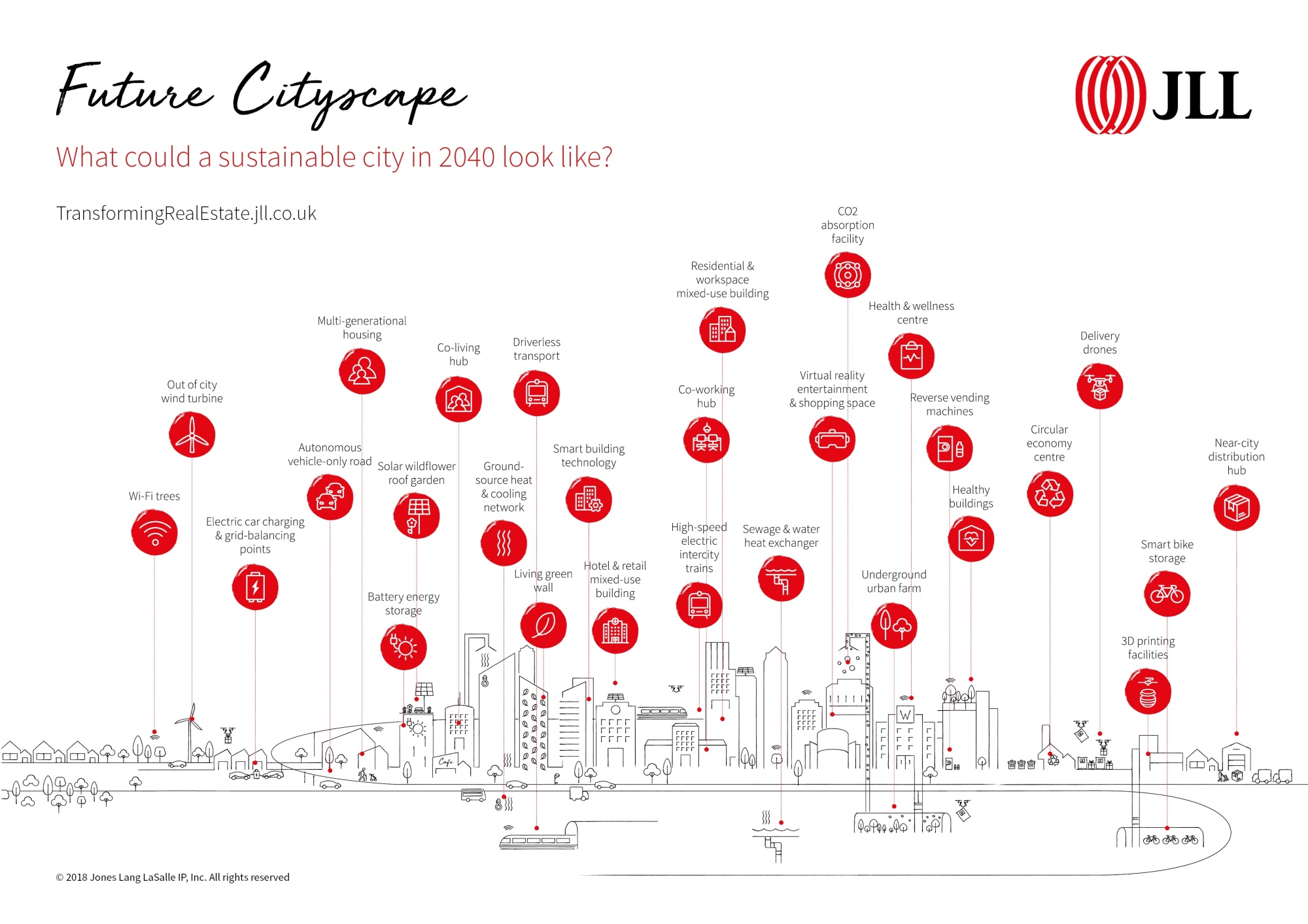What is the Smartest City in Europe?
With London previously taking the top spot for smart technology infrastructure, which European city has emerged as 2024’s smartest? The Smart City Index uses...
Read Full Article
JLL has revealed its vision of the future cityscape and how businesses can adapt to thrive within it. Wi-Fi trees, driverless transport, smart buildings and co-working will be commonplace in 2040 says the firm.
JLL published its report revealing the ideal cityscape in 2040 and a transformation framework enabling real estate businesses to adapt and thrive in this future city. According to the report, 'The Transformation Framework', the ideal cityscape in 2040 will have adapted to the trends driving the real estate sector over the next 20 years and will include co-working and living space, smart and healthy buildings, Wi-Fi trees, reverse vending machines, driverless transport and multi-generational housing as standard.
To create the future cityscape, JLL asked some of the UK’s leading real estate owners, occupiers, developers and investors what they thought the ideal city would look like in 2040, while taking into account the seven trends that JLL predict will influence real estate and infrastructure globally over the next two decades. These trends included tech innovation, urbanisation, land & resource scarcity, the low carbon economy, demographic & workplace change, health & wellness and transparency & social value.
Alongside the future cityscape, JLL has created a Transformation Framework to enable real estate businesses to respond and thrive in a world in which environmental, economic, and social change is constant. The framework focuses on a company’s business strategy, governance, funding, skills, partnerships and innovation and identifies how each will cope with the challenges presented by the numerous changes in the sector.
Emma Hoskyn, director, Upstream Sustainability Services, JLL, said: “To succeed and thrive in a world that is continuously changing, radical thinking is needed. Rather than tackling each real estate trend individually to accomplish objectives in the short or medium term, companies need to incorporate the seven trends into every step of their business decisions, long-term vision and structure. Our future cityscape is a representation of what the real estate industry should strive for, while our transformation framework is the key to helping real estate leaders react and adapt to each trend positively to transform their businesses now and enable them to flourish until 2040, and beyond.”
Picture: JLL's Future City
Article written by Cathryn Ellis | Published 22 March 2018
With London previously taking the top spot for smart technology infrastructure, which European city has emerged as 2024’s smartest? The Smart City Index uses...
Read Full ArticleLibraries, theatres and leisure centres in the South East of England are being targeted for carbon emission reduction in association with SSE Energy Solutions and Medway...
Read Full ArticleMasdar City is being hailed as a best-in-class example of an eco city of the future and a hub for cleantech companies. Watch the...
Read Full ArticleEquans and Valeo have launched their partnership to create intelligent and low-carbon cities of the future at the VivaTech trade show in Paris. The companies will work...
Read Full ArticleA study from a PropTech platform has revealed the ten European cities that are best prepared for a smart future – but which city has topped the list? Using...
Read Full ArticleFirst announced in January 2021 by His Royal Highness Mohammed bin Salman, Crown Prince of Saudi Arabia and Chair of the NEOM Company Board of Directors, THE LINE is...
Read Full ArticleRinnai, in collaboration with Toyota and Woven Planet, is working on an innovative new application of hydrogen for food preparation. All three companies share a...
Read Full Article15 minute city concepts have been demonstrated in Paris, Adelaide, London and Dublin. But is the concept as new as we might have thought? Watch the...
Read Full ArticleAfter almost two years of stops and starts due to the pandemic, enduring resilience is defining the built environment – that’s according to Gensler’s...
Read Full ArticleThe Smart Centres Index has published its latest findings on the world’s best hubs for the development of new technology. The global ranking is updated every six...
Read Full Article